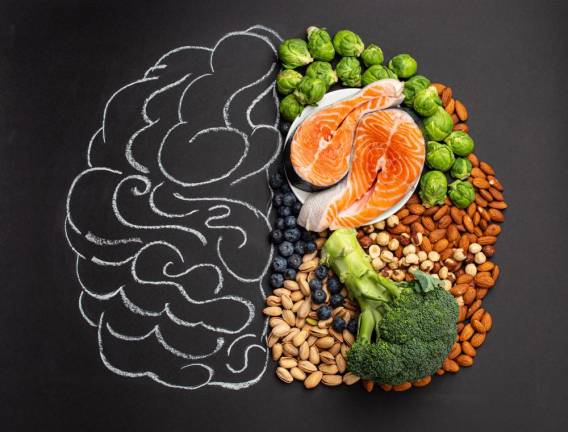Feeding an Aging Brain
Brain Food. Antioxidant foods enable the brain, even an aging one, to continue to form synaptic connections

Once upon a time, neurologists believed that after a certain age, say, 30, your brain would begin to shrink, taking your memories with it. Today, scientists who have actually taken the time to sit down and count brain cells find practically no age-related loss of cells responsible for thinking and remembering, a pleasant conclusion with some bad news/good news footnotes.
The first bad news is that every day your body normally produces free radicals, busily reactive atoms that can damage cells and DNA. The good news is that you also produce or consume anti-oxidants, natural neutralizing chemicals that keep the radicals in check. Which is followed by the second bad news: As you age, the balance between free radicals and neutralizers may wobble, affecting your brain’s ability to form synapses, the connections between cells that enable memory.
But here’s the final good news: Because these are oxygen-related reactions, there’s a way to ameliorate the effect by consuming antioxidant foods, that is, foods packed with substances that enable the brain, even an older one, to continue to form synaptic connections.
The watchword here is ORAC, four letters that stand for Oxygen Radical Absorbance Capacity, a measurement system created at the Jean Mayer USDA Human Nutrition Research Center On Aging at Tufts University in Boston to quantify the antioxidant value of specific foods.
The average American diet dishes up about 800 ORAC points a day. USDA’s optimal recommendation is 12,000 points but the agency is willing settles for at least 3,000-5,000.
Which foods deliver? Chocolate lovers will love the fact that cocoa powder is top of the list with 26,000 ORAC points per 100 g/3.5 oz. But let’s be real, you’re hardly likely to sit down with a spoon and scoop up that much cocoa powder, so how about one semi-sweet chocolate bar (18,053) or a dark chocolate one (13,120). Fruit and veggie fans can choose 100 g/3.5 oz of purple plums (6,259), pitted prunes (5,770), fresh blueberries (6,520), blackberries (5,245), pecans (17,542) or hazelnuts (9275). For dozens of other possibilities check out USDA’s comprehensive catalogue at https://www.drgourmet.com/column/dr/2010/usda-orac.pdf
Now, moving on to other brain boosters:
Are vitamins vital? Short answer: Yes. Long answer: It depends on the vitamin. Clearly the brain goes better with B’s, specifically, says the Mayo Clinic, the B12 found naturally in foods that come from animals, including fish, meat and poultry.
Naming the memory nutrient: Protein, fat or carbs? All of them. Scientists at the University of Toronto fed volunteers either carbs, fat, protein, or a look-alike formula, and then asked them all to read a paragraph to test how much they could remember. The results: “Compared with the placebo, all 3 macronutrients improved delayed paragraph recall and improved or tended to improve immediate recall 15 minutes after ingestion.”
Watch your weight, watch over your brain. Yes, obese older adults, even those whose thinking and memory is sharp as a tack, seem to have lower brain volume. But that doesn’t mean that if your weight is average losing what you consider an extra few pounds will boost your brain. Researchers say the brain clearly benefits from your maintaining a healthful weight.
In the end, as with so much in nutritional life, it comes down to that same old/same old balanced diet. With plenty of chocolate.